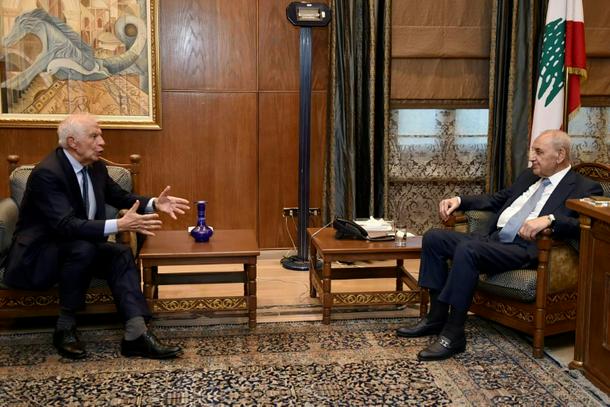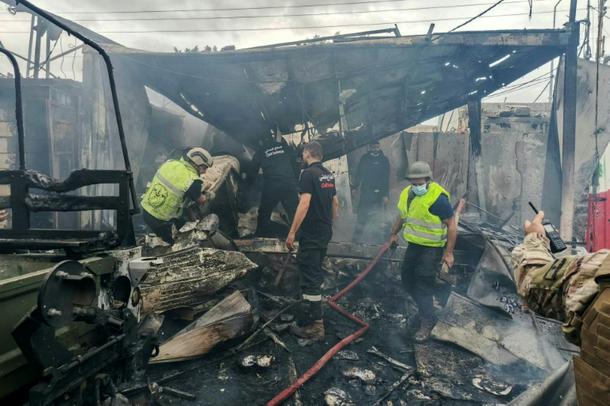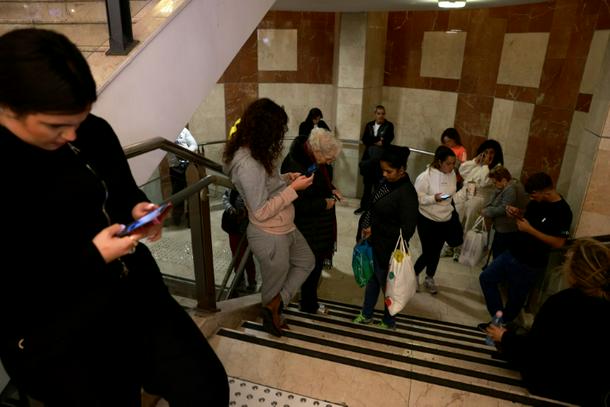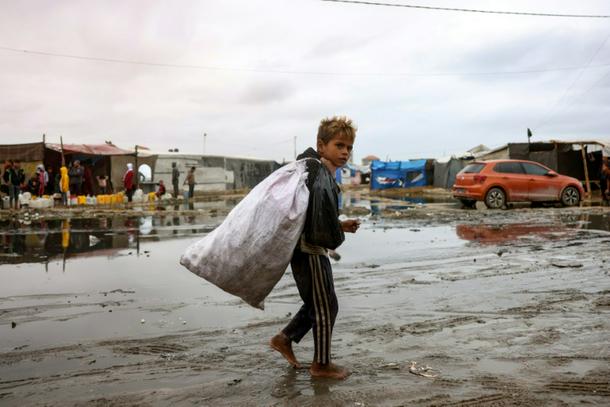
Lebanese Parliament Speaker Nabih Berri met with European Union foreign policy chief Josep Borell in Beirut -- Berri has led mediation efforts on behalf of his ally Hezbollah
Beirut (Lebanon) (AFP) - Top EU diplomat Josep Borrell called for an immediate ceasefire in the Israel-Hezbollah war while on a visit to Lebanon on Sunday, as the militant group claimed attacks deep into Israel.
The Israeli military said Iran-backed Hezbollah fired around 160 projectiles into Israel during the day. Some of them were intercepted but others caused damage to houses in central Israel, according to AFP images.
A day after the health ministry said Israeli strikes on Beirut and across Lebanon killed 84 people, state media reported two strikes on Sunday on the capital’s southern suburbs, a Hezbollah stronghold.
Israel’s military said it had attacked “headquarters” of the militant group “hidden within civilian structures” in south Beirut.
War between Israel and Hezbollah escalated in late September, nearly a year after the group began launching strikes in solidarity with its Palestinian ally Hamas following that group’s October 7 attack on Israel.

Rescuers douse the flames at the scene of an Israeli air strike that hit a Lebanese army post in southern Lebanon
The conflict has killed at least 3,754 people in Lebanon since October 2023, according to the health ministry, most of them since September.
On the Israeli side, authorities say at least 82 soldiers and 47 civilians have been killed.
Earlier this week, US special envoy Amos Hochstein said in Lebanon that a truce deal was “within our grasp”, and then headed to Israel for talks with officials there.
In the Lebanese capital, Borrell held talks with parliamentary speaker Nabih Berri, who has led mediation efforts on behalf of ally Hezbollah.

Residents of central Israel gather underground after being warned of rockets fired from Lebanon
“We see only one possible way ahead: an immediate ceasefire and the full implementation of United Nations Security Council Resolution 1701,” Borrell said.
“Lebanon is on the brink of collapse”, he warned.
Under Resolution 1701, which ended the last Hezbollah-Israel war of 2006, Lebanese troops and UN peacekeepers should be the only armed forces present in the southern border area.
The resolution also called for Israel to withdraw troops from Lebanon, and reiterated earlier calls for “disarmament of all armed groups in Lebanon.”
- Lebanese soldier killed -
The Lebanese army maintains a presence across the country’s territory, but it is Hezbollah – one of the world’s best-armed non-state forces – that holds sway in key areas along the border with Israel.
While the Lebanese army is not engaged in the Israel-Hezbollah war, it has suffered multiple fatalities, the latest coming on Sunday.

Firefighters use a bulldozer as they try to douse flames on higher floors of a building after an Israeli air strike on the al-Hadath area of Beirut’s southern suburbs
The army said an Israeli strike on a military post killed one soldier and wounded 18 others.
Also on Sunday, Hezbollah said it launched attacks using missiles and drones directed at a naval base in southern Israel and military sites in the central Tel Aviv area.
It said it had “launched, for the first time, an aerial attack using a swarm of strike drones on the Ashdod naval base”, one its deepest targets so far.
Hezbollah also said its fighters had launched a volley of missiles at the Glilot military intelligence base on the outskirts of Tel Aviv, a facility it has announced previous attacks against.
The Israeli military did not comment on the specific claims, but it said earlier that air raid sirens had sounded in several areas, including in the Tel Aviv suburbs.
Medical agencies reported that at least 11 people were wounded in Israel.
AFP images from Petah Tikva, near Tel Aviv, showed several damaged and burned-out cars, and a house pockmarked by shrapnel. In nearby Rinatya, several houses were damaged.
The wave of projectiles follows at least four deadly Israeli strikes in central Beirut in the past week, including one that killed Hezbollah spokesman Mohammed Afif.
Israeli strikes have also targeted the city’s southern suburbs on a near-daily basis for the past two weeks, but were briefly halted during US envoy Hochstein’s visit.

A displaced Palestinian child carrying a bag walks barefoot in a displacement camp in the central Gaza Strip
On Sunday, the official National News Agency said “Israeli warplanes launched two violent strikes on Beirut’s southern suburbs”, after the Israeli military posted warnings online.
AFPTV footage showed grey smoke billowing over the area, with the news agency reporting “massive destruction”.
- Hospital chief hit -
In Gaza, Hamas’s armed wing said Saturday that an Israeli hostage, captured during the group’s October 7 attack which triggered the war, had been killed.
Israel’s military said it could neither “confirm nor refute” the claim.
Israeli protesters held another of their regular Saturday rallies in Tel Aviv to demand their government reach a deal to free remaining hostages.
On Sunday, Gaza’s civil defence agency said a drone strike had seriously wounded a hospital chief in an attack on the health care facility, while Israeli raids killed 11 people across the territory.
Hossam Abu Safiya heads the Kamal Adwan hospital, one of just two partly operating facilities in northern Gaza, where the UN has decried “catastrophic” humanitarian conditions.
Hamas’s October 7 attack on Israel resulted in the deaths of 1,206 people, mostly civilians, according to an AFP tally of Israeli official figures.
Israel’s retaliatory campaign in Gaza has killed at least 44,211 people, most of them civilians, according to data from the Hamas-run territory’s health ministry, which the United Nations considers reliable.
Criticism of Israel has mounted over its conduct of the war.

Rescuers and residents in central Israel's Petah Tikva, after rockets were fired from Lebanon
This week the International Criminal Court issued arrest warrants for Prime Minister Benjamin Netanyahu and his former defence minister Yoav Gallant, as well as Hamas military chief Mohammed Deif who Israel says is dead.
On a visit to Damascus on Sunday, UN special envoy Geir Pedersen said it was “extremely critical” to achieve regional de-escalation and ensure that “Syria is not further dragged into this”.
Israel has intensified its strikes on targets in Syria during its war with Hezbollah. A war monitor said an air raid this week on the city of Palmyra killed 105 people, the vast majority of them pro-Iran fighters.